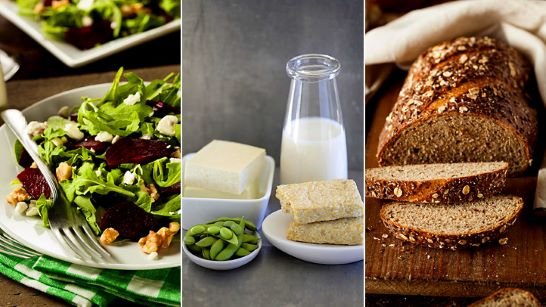
Did you know that what and how much you eat can affect your risk of developing certain cancers? According to the American Cancer Society, about 20 percent of all cancer diagnoses in the United States are linked to diet and excess weight, along with inactivity.
Much of the research linking diet and cancer is “substantial, yet inconclusive,” according to the World Cancer Research Fund (WCRF) and the American Institute for Cancer Research (AICR). That’s because it is very difficult to establish a definitive link between cancer and specific foods or nutrients. Most findings come from tracking dietary patterns in different populations.
The WCRF and AICR issued cancer prevention recommendations as part of a report first published in 2007. Their findings were based on a review by an international panel of scientists of studies related to the connection between cancer risk, food, nutrition, and physical activity. The following are some key dietary recommendations based on that report and other cancer research.
Eat Fruits, Vegetables, and Whole Grains
Plant foods contain powerful micronutrients, such as flavonoids and carotenoids, which studies show are strong antioxidants. They counter damaging reactions (oxidation) from biological processes that can harm or kill cells. Plant nutrients also reduce inflammation, which is associated with the development of cancer, and some can stop or even kill cancer cells.
Like healthy cells, tumor cells need nutrients, which are delivered through a network of tiny blood vessels. Tumors can actually initiate the growth of new blood vessels through a process called angiogenesis. Some compounds in plant foods prevent angiogenesis.
“An anti-angiogenic diet is one composed of foods and beverages containing naturally occurring substances shown to prevent harmful blood vessels that feed cancers,” says William Li, MD, the president and medical director of the Angiogenesis Foundation. “Such a diet includes a wide range of fruits and vegetables, spices, beverages — including fruit juice, tea, coffee, and wine — and proteins that contain naturally occurring cancer-starving activity [certain fish, shellfish, or dairy products, for example].”
In addition to garlic, berries, tomatoes, cruciferous vegetables (such as broccoli and cauliflower), and leafy greens, there are some lesser-known but equally powerful cancer-prevention foods you may want to include in your diet: red onions, apples, papaya, pomegranate, cinnamon, pumpkin, and broccoli sprouts (immature broccoli plants). Many of the important chemicals in plants are concentrated in the skins, so eat the whole fruit or vegetable when possible.
Be Sure to Get Your Fill of Dietary Fiber
Whole grains, beans, peas, lentils, fruits, and vegetables provide fiber, which helps move food quickly through the digestive tract and helps eliminate carcinogens and estrogens, high levels of which are associated with increased breast cancer risk.
Eat Real Soy Products — Not Processed Ones
Soy intake has been inversely associated with cancer risk, according to an analysis of diet and cancer published in 2012 in the Journal of Oncology. Amanda Bontempo, RD, an ambulatory oncology dietitian at the Perlmutter Cancer Center at New York University's Langone Medical Center in New York City, says real soy food, such as tofu and edamame, can be beneficial. But watch out for highly processed soy products such as “faux” meat substitutes or soy supplements. It’s worth noting, too, that soy contains isoflavones, which are similar to estrogens. Some research has suggested they may promote breast cancer growth, while a study published in March 2017 in the journal Cancer found that breast cancer survivors who consumed the most soy had a lower risk of death over a ten-year follow-up period.
"The timing of exposure to soy is important as well," says Bontempo. “The most protective effects begin before puberty and continue through adulthood."
Limit Meat, Alcohol, and Dairy Consumption
Studies suggest a link between dairy products and prostate cancer risk, while alcohol is associated with an increased risk of liver cancer, breast cancer, and cancers of the digestive tract. Red meat and processed meats, which are high in saturated fats, are associated with increased risk for certain cancers. And Bontempo points out that the link between red and processed meats and colon cancer is well established.
"We also tend to overeat these foods, which leads to chronic, prolonged inflammation, a common denominator in many diseases, including cancer,” Bontempo says. “Less is more. Treat meat as a treat.”
However, Dr. Li says anti-angiogenic substances can occur in dairy and certain meats. “For example, menaquinone (vitamin K2) is anti-angiogenic, and it is a by-product of bacteria in certain hard cheeses. It also accumulates in the dark meat [thighs] of chickens.”
It’s Not Just What You Eat — It’s How Much
Obesity is a significant risk factor for several types of cancer. According to the National Cancer Institute, it has been associated with a higher risk for breast, colon and rectum, endometrial, esophageal, and pancreatic cancers, among others.
“Decrease portion sizes,” Li advises. “Eat only about one-third of what your appetite tells you to eat. If you eat slowly, you'll fill up."
Source : everydayhealth.com
Hi! I am a robot. I just upvoted you! I found similar content that readers might be interested in:
https://www.everydayhealth.com/news/what-best-diet-cancer-prevention/